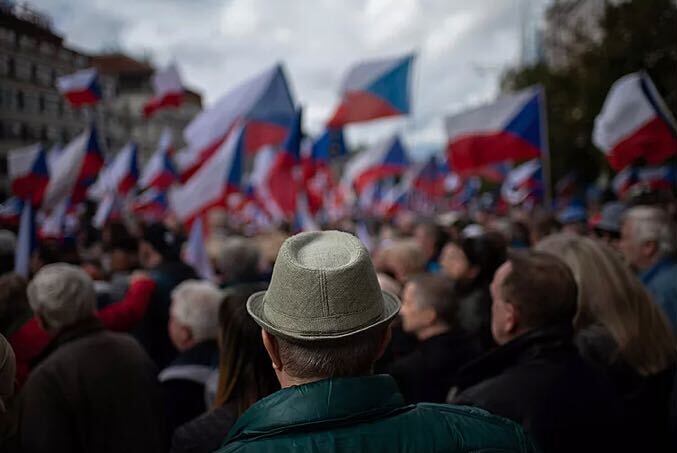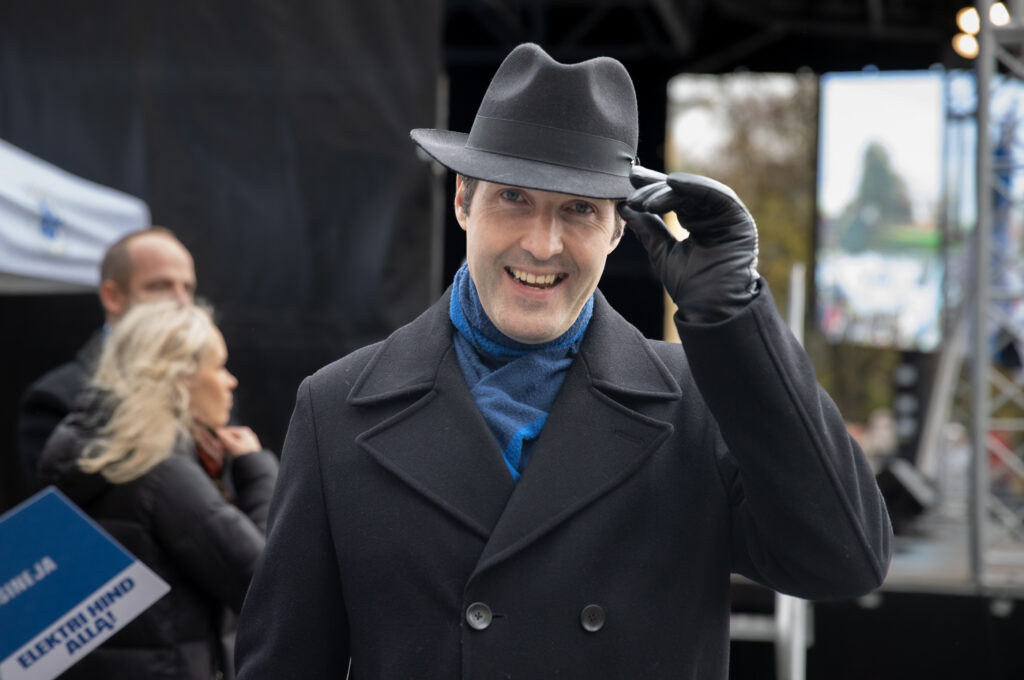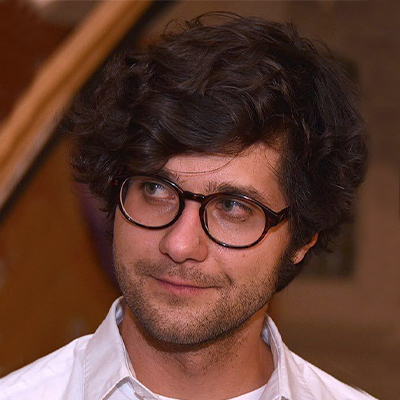Hi from Rome,
In Italy we are still grasping the new reality of being the epicentre of the European far right, but other countries could soon catch up. In Estonia, for example, the EKRE party is growing practically at the same speed as inflation.
And it’s no coincidence. If you have a complex crisis and widespread discontent, as is unfolding now in many European countries in reaction to skyrocketing energy bills, there will be right-wing populists trying to capitalise.
Take a look at Prague and the “Czechia First” demonstration. Take a look at Viktor Orbán debuting on Twitter. Our Berlin colleague wonders if she should expect the German far right to grow together with the bills – and as Europeans we face the same question.
The good thing is that history won’t be written without us, or “La storia siamo noi”, as we say in Italy. There are alternatives. In this edition, you can find at least one, in the streets of Paris…

“The nation has risen!” exclaimed organisers of the demonstration “Czechia First” in Prague at the end of September. “We are taking the country back!” Not really. The crowd was half the 70,000 who three weeks earlier “filled up Venceslaus square” – a symbolic feat. Yet, the thousands who came together marked a solid attendance. The protest, which focused on high energy prices and the cost of living but quickly morphed into a general political demonstration, is maintaining momentum.
“Let the Praguers see how expensive life is,” says a man from Eastern Bohemia. “I’m from Prague, whaddya talking about?” asks a woman nearby. “It sucks everywhere,” they agree. The culprits: the government, Brussels, Berlin and Washington, helping Ukrainians instead of their own people. Organisers demand the demise of the government, a gas deal with Russia, no support for Ukraine, no electricity exports, ‘czexit’ and the ‘complete turnover’ of Czech politics.
Ladislav Vrábel and Jiří Havel, the men behind the protests, established themselves on the far-right scene during the pandemic by opposing restrictions (and spreading disinformation, by some). This is the first time they’ve received national attention, though. The huge success of the first protest was a booster. The far right, having failed to capitalise on the pandemic, now feel it may have a shot.
But the movement is marred by mutual distrust and bickering, typical for the Czech far right. The next gathering is planned for the national holiday of October 28. Either they can capitalise further on the wrath of the people, or it’s another ‘missed opportunity’ for the Czech far-right.

On Sunday, many Estonians gathered on Tallinn’s Freedom square to join the right-wing populist EKRE party in a protest against high energy costs. The event was attended by many who were in genuine distress.
At 25%, Estonia has the highest inflation in the EU. A great deal of that comes from the electricity bills that keep growing at a seemingly endless rate. The same is happening to the popularity of EKRE and it’s not even winter yet.
The media is ablaze with ads featuring party leader Martin Helme’s promises of electricity at a fraction of the current cost. On March 5, with the suffering likely at its peak, Estonians will vote in a general election.
Many believe that what’s happening is the result of Putin’s attack on Ukraine. This is what Estonia’s liberal prime minister, Kaja Kallas, keeps pointing out. She has been popular, but is now on the defensive and might soon lose her lead to Helme, who says that Kallas and Ursula von der Leyen, not Putin, are responsible for rising prices.
Her party can’t blame all of what is happening in the polls on deceitful and manipulative messages from Helme and his allies. The Reform Party has been in government for all but five years since 1999.
Many experts have complained that Estonia has had an aimless energy policy throughout this time. The result is a poor energy mix with too few renewables and too much dependence on other countries.
The consequence may be Hungarian Prime Minister Viktor Orbán gaining one more ally at Europe’s decision-making table.

Viktor Orbán uses Twitter to tackle Hungary’s energy crisis. This is the only logical explanation as to why he joined the platform a week ago, why he communicates entirely in English and why he was looking for his friend Donald Trump with a confused Travolta meme. He wants to win an international audience for his cause.
The Hungarian prime minister is trying to maintain his popularity with cheap petrol, which he can only finance because Russian oil coming by pipeline is much cheaper than sea freight. Orban has built his economic success so far on Russian energy imports.
The country’s budget cannot pay for the much needed transition away from Putin’s companies. That’s why he must seize every opportunity and use every platform to lobby against sanctions, which he sees as the root of all his problems. His dependence makes him more aggressive than ever.

Matthias Quent is a sociologist and expert on the far right. He teaches at the Eastern German University Magdeburg-Stendal, where he also co-founded the Institute for Democratic Culture.
Concerning the recent rightist demonstrations in the eastern part of Germany – are they rather a “grassroots” uprising or organised by some central players?
It’s a bit of both: on October 8, we had the big demonstration called “Energy security and protection against inflation – our country first”, organised by Germany’s far-right party AfD with more than 10.000 people in Berlin. It was the only big demonstration in recent times: we mostly see decentralised gatherings being part of networks which have emerged during the pandemic.
Can the huge financial aid from the government help to keep rightist protests down?
What we see just now are no social uprisings, we see nationalist uprisings. They are campaigning against migrants as well as against covid prevention measures and mixing it up with the energy topic.
Of course, good social politics is extremely important to prevent discontentment among those who do not yet identify as far right, a discontentment which may be instrumentalised by nationalist players. However, nationalism is present anyway, it doesn’t need an energy crisis to emerge.
There will also be real social protests during the upcoming weekend by left-wing groups trying to differentiate themselves clearly from alleged social protests of the right.
How strong is Russian influence over the German far right?
It’s difficult to say. On October 3, Björn Höcke, a right-wing exponent even within AfD, held a speech in Gera where he explicitly stood up for a pro-Russian agenda. Of course, one popular argument of the far right doesn’t work anymore now: the call for opening Nord Stream 2.
Although there is no renewed proof of concrete Russian influence in recent times, it doesn’t seem that the far right is dependent on it so much: it is strong in eastern Germany anyway.

In the first half of 2022, Total, France’s largest oil company, made a profit of 10.4 billion euros. With the war in Ukraine, the price of crude oil has soared while the cost of production has remained stable. This is an unacceptable margin in the eyes of the left… and a perfect occasion to try to capitalise on the energy issue. Last Sunday, the entire French left came together despite its divisions in a demonstration against high living costs and climate inaction. Their main proposal? Taxing the super-profits made on oil.







